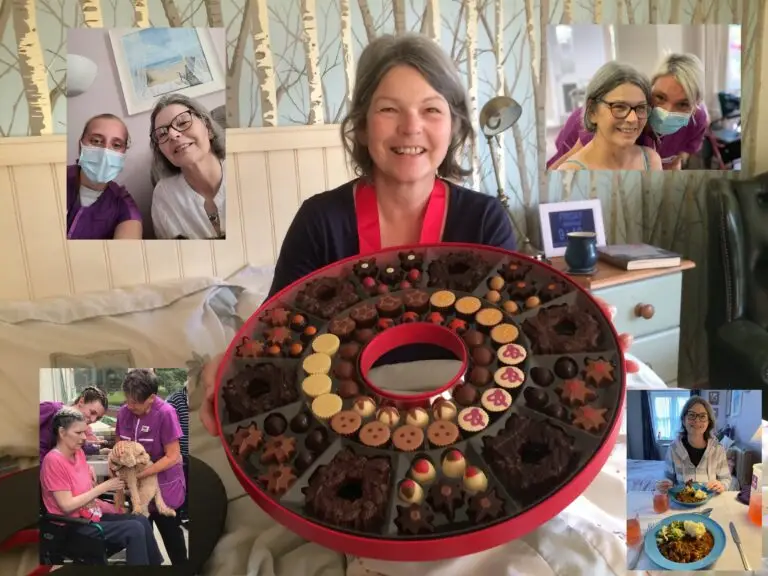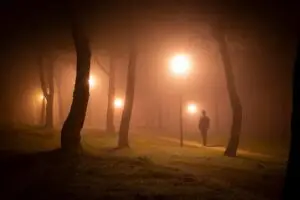
Caregivers the Silent Guardians and Unsung Heroes
When I posted this it was the winter solstice in the Northern Hemisphere. In just a couple of days, many of us will be embracing traditions rooted in the old Yule festival, including the Yule log, evergreen decorations of holly, ivy, mistletoe, and fir trees, gift-giving, and, of course, feasting and drinking, all adapted for contemporary life. The original festival celebrated the return of the Sun after the darkest part of the year, a turning point in nature that brought hope, promising spring and new beginnings.
What better timing could there be for me to acknowledge the small number of people who guided me through my metaphorical winter—the hardest, darkest, coldest season I have ever faced or will ever face—and who walked alongside Tina as she journeyed through her final winter? Not only did they help me through it, but they also showed me how to prepare for the spring that eventually followed. I did more than survive; I emerged enlightened and transformed. These few, at least in my eyes, epitomise humanity at its finest.
Of course, my few are not alone; they are simply the ones who touched my life. Countless unsung heroes deliver practical humanity every day, their actions often going unnoticed. With dementia, there is but one ending, and reaching it is neither quick nor easy. Yet extraordinary people not only make the journey manageable—they also illuminate the way, enabling you and your loved one to share moments of joy. And, when the practicalities of care become complex and overwhelming, they are there to shoulder the burden.
Whatever seasonal messages or greetings you receive this year will surely reference hope and love. From the perspective of living with dementia, both can be found in the gentle, committed hands of exceptional caregivers. If I were granted but one wish, it would be that everyone in need of caregivers’ support is as fortunate as we were.

For a long time, I struggled with a feeling of guilt—a secret I probably did not disguise well. Some of Tina’s carers mean as much to me as my closest friends or family—people with whom I have shared a lifetime of adventures, people I trust and respect. Wonderful and supportive friends were somehow displaced by a small number of strangers I had known for such a short time.
Yet nothing has fundamentally changed in my world of friends and family. It remains as it always was—a world where relationships are built on a series of shared moments, the depth and strength of each shaped by the experiences we have endured or enjoyed together. The more momentous the experience, or the more numerous the shared moments, the greater the bond. Time is not truly a factor, nor does being kin grant any special privileges, particularly as adults. What matters most are our actions—how we treat and support each other, especially in times of need.
And need is the key word here. In life, among our friends and family, we undoubtedly need each other, but rarely is that need vital or critical—a matter of survival. My need for Tina’s carers was unquestionably a matter of survival. Perhaps not in a literal life-or-death sense, but without their support, I would have crumbled and failed Tina.
For over two years, we shared the burden and challenges of Tina’s well-being. It was a world unlike anything I have ever experienced. Only we know the full extent of Tina’s final and most demanding years. Only we understand the trials and tribulations she faced. And only we escorted her, holding her hand every single day, right to the very end. If that doesn’t create a strong bond, then what else could?
You may have no reason to think of caregivers as guardians or heroes, but let me assure you: experienced caregivers are both. The aspiring novice caregivers are angels-in-waiting, and they are all out there, near you, ready to ease your weary journey. If you ever find yourself walking a similar path, know that you will not be alone. Support will be there for you too—compassionate, skilled hands to help carry the weight and guide you through even the darkest days.
From the day Tina was assessed before entering the care home to the day her spirit soared and her body was escorted from its doors with reverence, one person stood unwaveringly by her side every step of the way. If we have spoken in the past three years, you will already know exactly who I mean: Jess.
Jess possessed an extraordinary ability to be present whenever she was needed, regardless of whether she was on shift. Her care extended far beyond professional duty; it was a true vocation. She often gave up her free time to help me take Tina out for meals at restaurants or on shopping trips to Stratford, ensuring Tina experienced moments of happiness and normality. But Jess’s devotion wasn’t limited to Tina. Her commitment to the residents of the dementia unit was nothing short of inspiring. Jess seemed to anticipate challenges before they arose, always sensitive to a resident’s immediate needs while keeping a watchful eye on the unit’s smooth running.
Emerging from the shadow of COVID brought immense challenges to delivering consistent, high-quality care. Efforts to improve often felt like three steps forward and two steps back, yet Jess remained steadfast. Her tenacity, resilience, and unwavering pursuit of the best for each resident were, for me, a constant source of admiration. The residents had a right to outstanding care, and Jess led the effort to deliver as both their champion and their friend.
I do not have the skill, nor do we have the time, to truly do justice to the impact Jess had on my life or to express what her care for Tina meant. In all my years, I have never needed anyone anywhere near as much as I relied on Jess, but I had also never faced such extreme circumstances. Her presence was not only a lifeline but a profound gift, for which I will be forever indebted.
But there were others whom I will always hold in my heart—those who were also part of that lifeline, who supported me and, more importantly, cared for Tina with a remarkable extra dedication. I think of it as humanity that exceeds professional duty. In every organisation, there are those who perform their roles well, meeting all the expectations of their responsibilities. While their contributions are valuable and often underappreciated, they are not the ones I speak of here.
Instead, I want to pay tribute to those whose compassion shone through in their actions, whose commitment left an indelible mark on both Tina’s life and mine. These are the people who leave a part of themselves behind on every shift, simply because a vulnerable person is in need of it.
There were too many to name here. Looking back at a tribute I once shared on Facebook dedicated to Tina’s carers, I counted 40 people, many of whom belong in this extraordinary group. I witnessed their remarkable skill in delivering personal care—often to an uncooperative person—always with dignity. I saw them linger with a resident, determined to overcome communication barriers because they sensed a subtle issue affecting well-being. Despite a demanding workload, I watched the lengths they went to in coaxing a smile from a withdrawn resident, and how that smile, in turn, lifted their spirits during an arduous shift.
I was even privileged with glimpses into their private lives—the stress of their job, the life-changing challenges they faced, some so shocking I still doubt my own recall of them. Yet they managed, endured, and moved forward. It is humbling to witness such compassion and care being given by people who, at the same time, can be fighting their own battles. I also felt privileged that they trusted me enough to share parts of their personal worlds.
This humble group did so much to ease Tina’s final journey, and it would be no exaggeration to say they also changed me as a person. They revealed to me the extraordinary resilience of the human spirit and the profound capacity for kindness. Their quiet acts of compassion became a source of strength when I needed it most, their unwavering dedication a lasting lesson in selflessness.
In their actions, I found a model of humanity at its finest—a reminder of the quiet heroes who walk among us, often unnoticed, leaving an immeasurable impact simply by giving of themselves without hesitation.
And what of those not in the previously mentioned group but whose delivery of care also went beyond duty? They are mostly the young newcomers, the novice angels in waiting, a group I admire for entirely different reasons. These are typically young people just starting out in life, for many their first job since leaving education. From a standing start, they choose a challenging path, complex, exhausting work with no glamour and little recognition.
Those who persevere through the initial weeks quickly grow into their roles, revealing themselves as natural caregivers. Their confidence blossoms alongside their compassion, each shift shaping them into something extraordinary. What sets them apart is the ease with which they develop another vital characteristic shared by all exceptional caregivers: the ability to genuinely enjoy the company of those living with dementia. They find ways to relate, to connect, and to bring moments of joy and understanding to lives often clouded by confusion and loss.
Spend enough time with them, and you catch glimpses into their private lives too. Their struggles, though unique to their age, are no less real. Watching them confront these challenges with determination and maturity is both humbling and motivating.
Though I might be older, I am still a relative newcomer to dementia care, and I often find myself looking to this group of youngsters for inspiration as I embark on my own path. Their energy, adaptability, and resilience encourage me to approach this journey with hope and openness.

I know that not all care homes are the same. I have met enough people who have not had, or are not having, the same experience I had. I also know there are caregivers for whom the work is simply a low-paid job and not a vocation.
However, I also know that many caregivers, wherever you find them, are deeply committed to benevolence. They embody compassion, patience, empathy, dedication, and humility. I have no doubt that everyone living with dementia will need their support at some stage, and, until we do, there is still so much we can learn from their example.
I do not believe that my experiences were unique, and I hope that sharing them can offer you a sense of strength, reassurance, and the belief that compassionate souls are ready to help you through the most difficult times. By engaging with them, you will find your burden lightened.
As the festive season surrounds us with its light and warmth, I want to wish you a time filled with moments to treasure, moments of happiness, and, beneath the rays of the ‘new sun’, a year of renewal and hope. May you, too, find your own silent guardians and everyday heroes, just as I did.

Did you like this post? Please leave a comment or share it. It helps to promote the blog so others can find it
